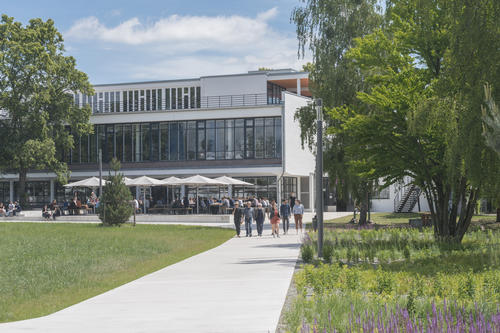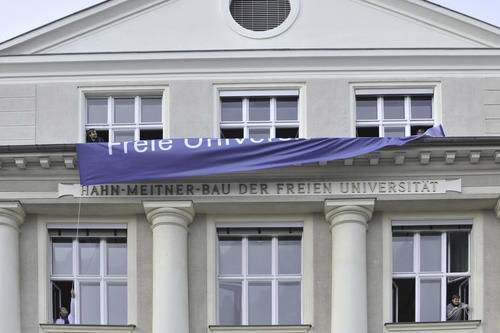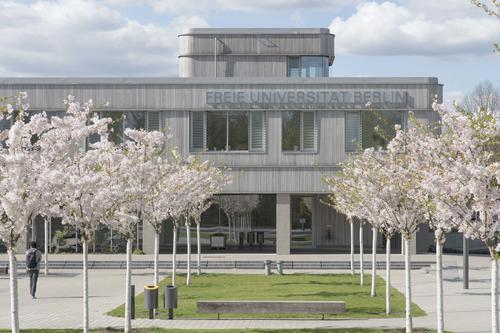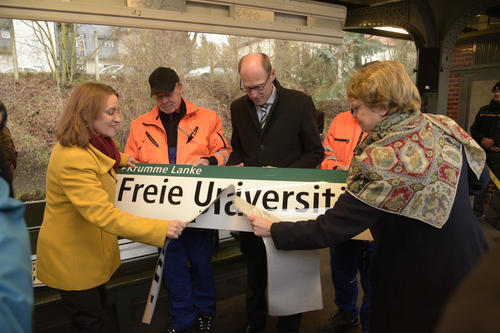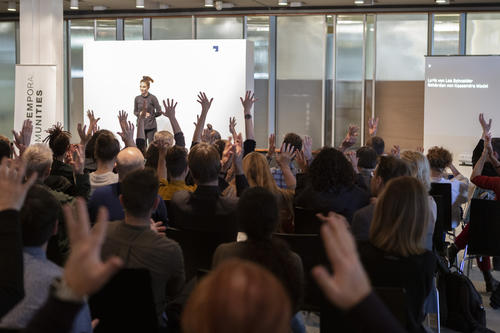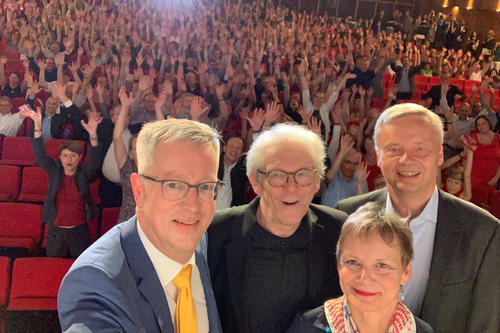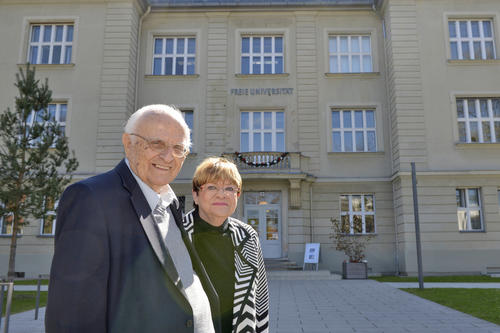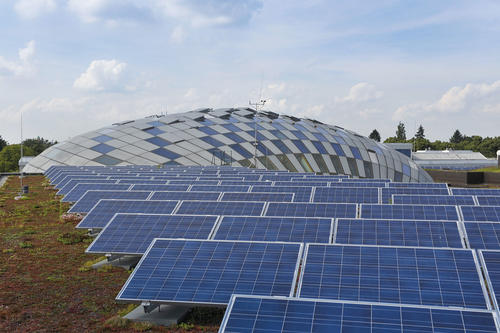The 2010s
January 11, 2010
The dining hall called Mensa I, which was built by the architects Hermann Fehling and Peter Pfankuch and opened in March 1953, had needed to be renovated within the restrictions for historical buildings. It reopened as the first vegetarian university cafeteria in Germany. Since then, carrot-ginger soup, for example, has been a regular item on the menu, as well as kohlrabi patties or bread dumplings with mushroom and apple ragout.
October 2010
The Otto-Hahn Building was renamed Hahn-Meitner Building in honor of the experimental physicist Lise Meitner. She had worked in the building at Thiel Allee 63 in Dahlem along with the chemist Otto Hahn for more than two decades from 1912 onward until she was forced into exile. Today it houses parts of the Institute of Chemistry and Biochemistry at Freie Universität.
June 2012
Freie Universität was able to defend its “University of Excellence” title, acquired for the first time in 2007 (photo: the Executive Board in June 2012). In 2012 Freie Universität was one of eleven universities nationwide to receive awards as part of the German federal and state governments’ Excellence Initiative. In the subsequent competition, the “Excellence Strategy,” Freie Universität applied together with Humboldt-Universität zu Berlin, Technische Universität Berlin, and Charité – Universitätsmedizin Berlin as a university consortium.
May 29, 2015
A new building complex dubbed the “Holzlaube” was completed on the campus in Dahlem.
Image Credit: Bernd Wannenmacher
A new building complex constructed for the Campus Library and 14 so-called small subjects within the Department of History and Cultural Studies was officially opened. The building was designed by the architectural firm of Florian Nagler. Due to its facade of cedar wood, it quickly earned a nickname, “Holzlaube,” to go along with its counterparts, the Rostlaube and the Silberlaube. The three buildings are all directly connected, and the new complex expanded the total area of the entire complex by one third. The Campus Library integrates the holdings of the 17 institute libraries of the “small subjects” as well as seven other libraries of Freie Universität Berlin. Approximately one million books, journal volumes, and other media as well as almost 1,000 workspaces are available on roughly 10,000 square meters.
December 11, 2016
To coincide with the 2016 winter timetable, the Thiel Platz subway station was renamed as Freie Universität station, giving the international university of excellence as well as the research campus in the southwestern part of Berlin more visibility on city maps. In the picture: Sigrid Evelyn Nikutta, chair of the board of the BVG public transportation company (at left), University Professor Peter-André Alt (center), and District Mayor Cerstin Richter-Kotowski (at right).
April 19, 2017
Freie Universität Berlin and the University of Zurich entered into a strategic partnership, aiming for close collaboration in research, teaching, and the promotion of early-career researchers, as well as regular student exchanges. Since 2011 Freie Universität has maintained strategic partnerships with the Hebrew University of Jerusalem and Peking University, since 2012 with Saint Petersburg State University, since 2014 with the University of British Columbia, and since 2016 with the University of California, Berkeley.
September 27, 2018
The Cluster of Excellence “Temporal Communities” held a series of events for their grand opening from October 24 to 26, 2019. The Cluster brings together literary scholars from various backgrounds.
Image Credit: Jürgen Morgenroth
Success for the Berlin universities in the Excellence Strategy, the research competition of the German federal and state governments and successor competition to the Excellence Initiative. Freie Universität, Humboldt-Universität zu Berlin, Technische Universität Berlin, and Charité – Universitätsmedizin Berlin recruited a total of seven clusters of excellence, including the only literary studies cluster in Germany. Freie Universität is involved in four of the seven research clusters and is the lead university for two of them.
February 1, 2019
Six leading European research universities came together to create a unique alliance – Una Europa. The founding universities were Freie Universität Berlin, Università di Bologna, KU Leuven, Universidad Complutense de Madrid, Uniwersytet Jagielloński in Kraków, and Université Paris 1 Panthéon-Sorbonne. Their common goal is to increase student and staff mobility, to create joint curricula for various subject areas, to facilitate flexible curriculum design for degree programs, and to contribute to the sustainable economic development of regions by having researchers and students work closely with local companies and government offices.
In the summer of 2019 and again in the summer of 2022, Una Europa received funding from the European Commission. The alliance has since expanded to include eleven universities. The new members are Helsingfors Universitet in Helsinki, University College Dublin, University of Edinburgh, Universiteit Leiden, Universität Zürich. Last updated: January 2023
July 19, 2019
Sabine Kunst, president of Humboldt-Universität (at front), Günter M. Ziegler, president of Freie Universität (at left), Karl Max Einhäupl, chief executive officer of Charité (center), and Christian Thomsen, president of Technische Universität.
Image Credit: Günter M. Ziegler
The Berlin University Alliance (BUA), consisting of Freie Universität Berlin, Humboldt-Universität zu Berlin, Technische Universität Berlin, and Charité – Universitätsmedizin Berlin, won funding in the Excellence Strategy of the German federal and state governments. It was the only consortium of universities to win this status. The BUA is receiving 24 million euros annually for seven years through the Excellence Strategy and an additional six million euros from the Berlin Senate to be awarded through the Einstein Foundation Berlin. The funds from the Berlin Senate are to support top-level appointments and research projects.
For Freie Universität this was its third major success in the German Excellence competition for universities. The university had already won Excellence standing in 2006/2007 and 2012.
October 19, 2019
Karol Kubicki with his wife Petra in April 2016 in front of the building at Boltzmann Strasse 3, the first building of Freie Universität Berlin.
Image Credit: Bernd Wannenmacher
Stanislaw Karol Kubicki died at the age of 93. A professor of clinical neurophysiology, Kubicki was a cofounder of Freie Universität while he was still a student. In fact, he was the first student to officially enroll in the new university. He continued to attend events and promote “his” university for most of his life. He was a guest of honor at the ceremony marking the 70th anniversary of the university’s foundingon December 4, 2018.
December 17, 2019
Freie Universität Berlin was the first German university to declare a state of climate emergency. By doing so, the university pledged to incorporate climate protection and sustainability across the university to a greater extent in the future and set the goal of attaining “climate neutrality” by 2025.

